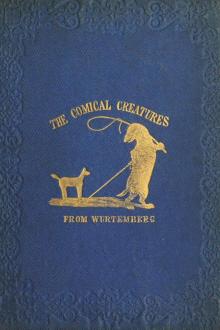The World of Ice by R. M. Ballantyne (reading eggs books TXT) 📗

- Author: R. M. Ballantyne
Book online «The World of Ice by R. M. Ballantyne (reading eggs books TXT) 📗». Author R. M. Ballantyne
“They’re all mad, ivery mother’s son o’ them,” exclaimed O’Riley, who for some time had been endeavouring to barter an old, rusty knife for a pair of sealskin boots.
“They looks like it,” said Grim, who stood looking on with his legs apart and his arms crossed, and grinning from ear to ear.
To add to the confusion, the dogs became affected with the spirit of excitement that filled their masters, and gave vent to their feelings in loud and continuous howling, which nothing could check. The imitative propensity of these singular people was brought rather oddly into play during the progress of traffic. Busby had produced a large roll of tobacco—which they knew the use of, having already been shown how to use a pipe—and cut off portions of it, which he gave in exchange for fox-skins, and deer-skins, and seal-skin boots. Observing this, a very sly old Esquimaux began to slice up a deer-skin into little pieces, which he intended to offer for the small pieces of tobacco! He was checked, however, before doing much harm to the skin, and the principles of exchange were more perfectly explained to him.
The skins and boots, besides walrus and seals’ flesh, which the crew were enabled to barter at this time, were of the utmost importance, for their fresh provisions had begun to get low, and their boots were almost worn out, so that the scene of barter was exceedingly animated. Davie Summers and his master, Mivins, shone conspicuous as bargain-makers, and carried to their respective bunks a large assortment of native articles. Fred and Tom Singleton, too, were extremely successful, and in a few hours a sufficient amount of skins were bartered to provide them with clothing for the winter. The quantity of fresh meat obtained, however, was not enough to last them a week, for the Esquimaux lived from hand to mouth, and the crew felt that they must depend on their own exertions in the hunt for this indispensable article of food, without which they could not hope to escape the assaults of the sailors’ dread enemy, scurvy.
Meetuck’s duties were not light upon this occasion, as you may suppose.
“Arrah, then, don’t ye onderstand me?” cried O’Riley in an excited tone to a particularly obtuse and remarkably fat Esquimaux, who was about as sharp at a bargain as himself. “Hallo! Meetuck, come here, do, and tell this pork-faced spalpeen what I’m sayin’. Sure I couldn’t spake it plainer av I was to try.”
“I’ll never get this fellow to understand,” said Fred. “Meetuck, my boy, come here and explain to him.”
“Ho, Meetuck!” shouted Peter Grim, “give this old blockhead a taste o’ your lingo. I never met his match for stupidity.”
“I do believe that this rascal wants the ’ole of this ball o’ twine for the tusk of a sea-’oss. Meetuck! w’ere’s Meetuck! I say, give us a ’and ’ere like a good fellow,” cried Mivins; but Mivins cried in vain, for at that moment Saunders had violently collared the interpreter, and dragged him towards an old Esquimaux woman, whose knowledge of Scotch had not proved sufficient to enable her to understand the energetically-expressed words of the second mate.
During all this time the stars had been twinkling brightly in the sky, and the aurora shed a clear light upon the scene, while the air was still calm and cold; but a cloud or two now began to darken the horizon to the north-east, and a puff of wind blew occasionally over the icy plain, and struck with such chilling influence on the frames of the traffickers that with one consent they closed their business for that day, and the Esquimaux prepared to return to their snow village, which was about ten miles to the southward, and which village had been erected by them only three days previous to their discovery of the ship.
“I’m sorry to find,” remarked the captain to those who were standing near him, “that these poor creatures have stolen a few trifling articles from below. I don’t like to break the harmonious feeling which now exists between us for the sake of a few worthless things, but I know that it does more harm than good to pass over an offence with the natives of these regions, for they attribute our forbearance to fear.”
“Perhaps you had better tax them with the theft,” suggested the surgeon; “they may confess it, if we don’t look very angry.”
A few more remarks were made by several of those who stood on the quarter-deck, suggesting a treatment of the Esquimaux which was not of the gentlest nature, for they felt indignant that their hospitality had been abused.
“No, no,” replied the captain to such suggestions, “we must exercise forbearance. These poor fellows do not regard theft in the same light that we do; besides, it would be foolish to risk losing their friendship. Go down, Meetuck, and invite Awatok and his wife, and half a dozen of the chief men, into the cabin. Say I wish to have a talk with them.”
The interpreter obeyed, and in a few minutes the officers of the ship and the chiefs of the Esquimaux were assembled in solemn conclave round the cabin table.
“Tell them, Meetuck,” said the captain, “that I know they have stolen two pieces of hoop iron and a tin kettle, and ask them why they were so ungrateful as to do it.”
The Esquimaux, who were becoming rather alarmed at the stern looks of those around them, protested earnestly that they knew nothing about it, and that they had not taken the things referred to.
“Say that I do not believe them,” answered the captain sternly. “It is an exceedingly wicked thing to steal and to tell lies. White men think those who are guilty of such conduct to be very bad.”
“Ah, ye villain!” cried Saunders, seizing one of the Esquimaux named Oosuck by the shoulder, and drawing forth an iron spoon which he observed projecting from the end of his boot.
An exclamation of surprise and displeasure burst from the officers, but the Esquimaux gave vent to a loud laugh. They evidently thought stealing to be no sin, and were not the least ashamed of being detected. Awatok, however, was an exception. He looked grave and annoyed, but whether this was at being found out, or at the ingratitude of his people, they could not decide.
“Tell them,” said the captain, “that I am much displeased. If they promise to return the stolen goods immediately, I will pass over their offence this time, and we will trade together, and live like brothers, and do each other good; but if not, and if any more articles are taken, I will punish them.”
Having had this translated to them, the chiefs were dismissed, but the expression of indifference on some of their faces proved that no impression had been made upon them.
In a quarter of an hour the articles that had been mentioned as missing were returned; and, in order to restore harmony, several plugs of tobacco and a few additional trinkets were returned by the messenger. Soon after, the dogs were harnessed, the sledges packed, and, with many protestations of good-will on both sides, the parties separated. A few cracks of their long whips—a few answering howls from the dogs—and the Esquimaux were off and out of sight, leaving the Dolphin in her former solitude under the shadow of the frowning cliffs.
“Fetch me the telescope, Mivins,” said the captain, calling down the hatchway.
“Ay, ay, sir,” answered the steward.
“Where’s my hatchet?” cried Peter Grim, striding about the deck, and looking into every corner in search of his missing implement. “It’s my best one, and I can’t get on without it, nohow.”
The captain bit his lip for he knew full well the cause of its absence.
“Please, sir,” said the steward, coming on deck with a very perturbed expression of countenance, “the—the—a—”
“Speak out, man; what’s the matter with you?”
“The glass ain’t nowhere to be seen, sir.”
“Turn up all hands!” shouted the captain, jumping down the hatchway, “Arm the men, Mr Bolton, and order the largest sledge to be got ready instantly. This will never do. Harness the whole team.”
Instantly the Dolphin’s deck was a scene of bustling activity. Muskets were loaded, jumpers and mittens put on, dogs caught and harnessed, and every preparation made for a sudden chase.
“There, that will do,” cried the captain, hurrying on deck with a brace of pistols and a cutlass in his belt, “six men are enough; let twelve of the remainder follow on foot. Jump on the sledge, Grim and Buzzby; O’Riley, you go too. Have a care, Fred; not too near the front! Now, Meetuck—”
One crack of the long whip terminated the sentence as if with a full stop, and in another moment the sledge was bounding over the snow like a feather at the tails of twelve dogs.
It was a long chase, for it was a “stern” one, but the Esquimaux never dreamed of pursuit, and, as their dogs were not too well fed, they had progressed rather slowly. In less than two hours they were distinguished on the horizon, far off to the southward, winding their way among the hummocks.
“Now, Meetuck,” said the captain, “drive like the wind, and lay me alongside of Awatok’s sledge, and be ready, men, to act.”
“Ay, ay, sir!” was the prompt reply, as the heavy whip fell on the flanks of the leaders.
A few minutes brought them up with Awatok’s sledge, and Captain Guy, leaping upon it with a clasp-knife in his hand, cut the traces in a twinkling, set the dogs free, and, turning round, seized the Esquimaux by the collar. The big chief at first showed a disposition to resent this unceremonious treatment, but before he could move, Grim seized his elbows in his iron grasp, and tied them adroitly together behind his back with a cord. At the same time poor Aninga and her baby were swiftly transferred to the sailors’ sledge.
Seeing this, the whole band of natives turned back, and rushed in a body to the rescue, flourishing their lances and yelling fiercely.
“Form line!” shouted the captain, handing Awatok and Aninga over to the care of O’Riley. “Three of you on the right fire over their heads, and let the rest reserve their fire. I will kill one of their dogs, for it won’t do to let them fancy that nothing but noise comes out of our muskets. Ready—present!”
A rattling volley followed, and at the same moment one of the dogs fell with a death-yell on the ice and dyed it with its blood.
“Forward!” shouted the captain.
The men advanced in a body at a smart run, but the terrified Esquimaux, who had never heard the report of firearms before, did not wait for them; they turned and fled precipitately, but not before Grim captured Oosuck and dragged him forcibly to the rear, where he was pinioned and placed on the sledge with the others.
“Now then, lads, that will do; get upon the sledge again. Away with you, Meetuck. Look after Awatok, Grim; O’Riley will see that Aninga does not jump off.”
“That he will, darlint,” said the Irishman, patting the woman on the back.
“And I shall look after the baby,” said Fred, chucking that series of dumplings under the chin—an act of familiarity that seemed to afford it immense satisfaction, for, notwithstanding the melancholy position of its father and mother as prisoners, it smiled on Fred benignly.
In five minutes the party were far on their way





Comments (0)